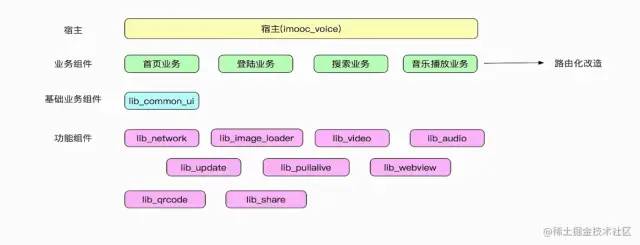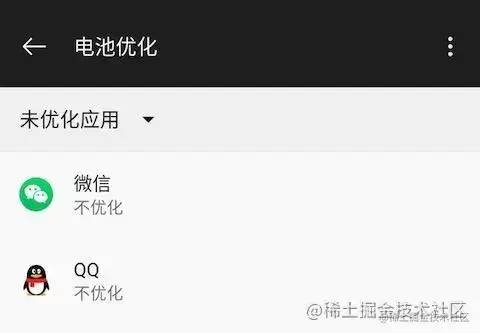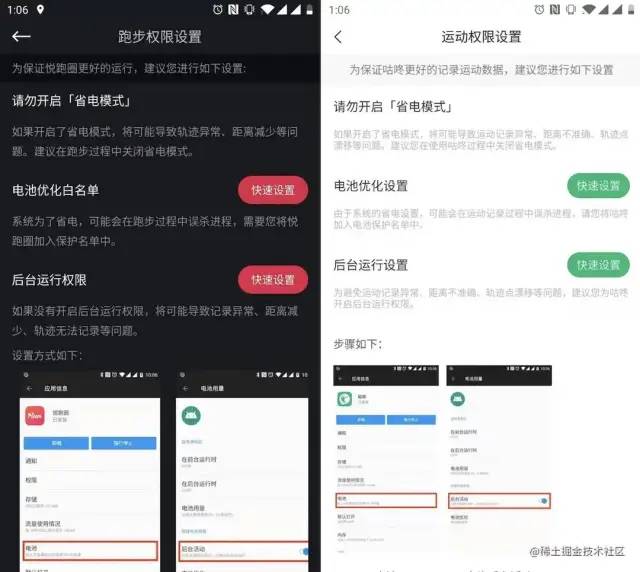Android进程保活组件的封装
前言
前面文章我们封装了网络请求组件lib_nework和图片加载组件lib_image_loader,今天我们来封装一个进程保活的组件lib_pull_alive
远古时代,出现过很多黑科技,比如MarsDaemon,使用双进程守护的方式进行保活,在当时可谓风光无限,可惜在8.0时代到来就被废弃了。
又比如后面出现的1像素Activity的保活方式,说他流氓一点不过分,如果每个人都使用这些操作,因为功耗的大大增加,会直接影响到手机使用寿命。因此各大手机厂商为了解决这一现象的发生,在系统层面对这些流氓行为做出了限制: 后台进程即使你是要黑科技让进程优先级很高,也可能被杀死,所以我宁愿称是应用的求生而不是保活。
这种方式初衷是好的,降低了设备功耗,降低了内存,防止手机发烫等,但是对于一些真正需要做保活操作的应用来说,可谓苦不堪言。
于是乎新型的求生措施又出现了。
如何优雅的进行求生
Android6.0以后系统推出了一个电池优化方案,对一些高耗电的进程会进行策略杀死。
那可能有人要问了,微信和qq这些高耗电应用是怎么做到保存的呢?
看下图
可以看到系统将微信和qq都放到了他们的白名单里面了,这个是怎么做到的呢?
其实, 这个是微信和厂商做了协商,将他们自己的应用设置到了他们的电量优化白名单中。下次产品再问我为啥他们可以做到的时候,我就把这张图甩给他们。。
那我们可不可以也让厂商给我们加名单呢?呃呃呃。。
好在手机厂商没有把路堵死,给我们留了一条后路
- 1.首先使用下面的代码检测我们进程是否在白名单中:
@RequiresApi(api = Build.VERSION_CODES.M)private boolean isIgnoringBatteryOptimizations() { boolean isIgnoring = false; PowerManager powerManager = (PowerManager) getSystemService(Context.POWER_SERVICE); if (powerManager != null) {
isIgnoring = powerManager.isIgnoringBatteryOptimizations(getPackageName());
} return isIgnoring;
}复制代码- 2.如果没有:调用下面的代码申请加入白名单
@RequiresApi(api = Build.VERSION_CODES.M)public void requestIgnoreBatteryOptimizations() { try { Intent intent = new Intent(Settings.ACTION_REQUEST_IGNORE_BATTERY_OPTIMIZATIONS);
intent.setData(Uri.parse("package:" + getPackageName()));
startActivity(intent);
} catch (Exception e) {
e.printStackTrace();
}
}复制代码申请时会弹出一个让用户选择的Dialog:
窗口中会提示该操作可能是影响电池的使用,如果需要监听用户的按键,可以使用startActivityResult在onActivityResult中监听
好了,白名单是加好了,那是不是就是万事大吉了呢?
手机厂商:哪有那么容易,就算你加入了电量优化白名单,你要是不按规矩来,在后台运行的进程还是会被我们杀掉?还有啥招式快快使出来吧
eee。。
我们知道进程被杀死,是因为系统的后台管理系统把我们重启的路堵住了,为啥堵我啊?按我说可能系统看你这个进程不顺眼吧,哈哈。。
言归正传:
其实是你不在后台管理的自启动白名单中,自启动白名单就像一张通行证,你的应用需要在系统后台自启动,就要在白名单上,否则哪里来回哪里去吧
那白名单这么好,怎么才能加入TM呢?
要知道市面上手机厂家很多,每个厂家的系统都不一样,一个系统还有很多甚至几十个版本,这让我们怎么加入啊?
而大部分自启动操作可以在厂商的手机管家的设置里面设置:
最理想的做法:我们根据不同手机,甚至是不同的系统版本,给用户呈现一个图文操作步骤,并且提供一个按钮,直接跳转到指定页面进行设置
- 我们先定义下面两个方法:
/**
* 跳转到指定应用的首页
*/private static void showActivity(Context context,@NonNull String packageName) { Intent intent = context.getPackageManager().getLaunchIntentForPackage(packageName);
context.startActivity(intent);
}/**
* 跳转到指定应用的指定页面
*/private void showActivity(Context context,@NonNull String packageName, @NonNull String activityDir) { Intent intent = new Intent();
intent.setComponent(new ComponentName(packageName, activityDir));
intent.addFlags(Intent.FLAG_ACTIVITY_NEW_TASK);
context.startActivity(intent);
}复制代码- 手机厂商判断:
华为:public boolean isHuawei() { if (Build.BRAND == null) { return false;
} else { return Build.BRAND.toLowerCase().equals("huawei") || Build.BRAND.toLowerCase().equals("honor");
}
}
小米public static boolean isXiaomi() { return Build.BRAND != null && Build.BRAND.toLowerCase().equals("xiaomi");
}
OPPOpublic static boolean isOPPO() { return Build.BRAND != null && Build.BRAND.toLowerCase().equals("oppo");
}
VIVOpublic static boolean isVIVO() { return Build.BRAND != null && Build.BRAND.toLowerCase().equals("vivo");
}
魅族public static boolean isMeizu() { return Build.BRAND != null && Build.BRAND.toLowerCase().equals("meizu");
}
三星public static boolean isSamsung() { return Build.BRAND != null && Build.BRAND.toLowerCase().equals("samsung");
}复制代码- 手机管家或者自启动界面启动方式:
华为:private void goHuaweiSetting() { try {
showActivity("com.huawei.systemmanager", "com.huawei.systemmanager.startupmgr.ui.StartupNormalAppListActivity");
} catch (Exception e) {
showActivity("com.huawei.systemmanager", "com.huawei.systemmanager.optimize.bootstart.BootStartActivity");
}
}
小米:private void goXiaomiSetting() {
showActivity("com.miui.securitycenter", "com.miui.permcenter.autostart.AutoStartManagementActivity");
}
OPPO:private void goOPPOSetting() { try {
showActivity("com.coloros.phonemanager");
} catch (Exception e1) { try {
showActivity("com.oppo.safe");
} catch (Exception e2) { try {
showActivity("com.coloros.oppoguardelf");
} catch (Exception e3) {
showActivity("com.coloros.safecenter");
}
}
}
}
VIVOprivate void goVIVOSetting() {
showActivity("com.iqoo.secure");
}
魅族:private void goMeizuSetting() {
showActivity("com.meizu.safe");
}
三星:private void goSamsungSetting() { try {
showActivity("com.samsung.android.sm_cn");
} catch (Exception e) {
showActivity("com.samsung.android.sm");
}
}复制代码总结下上面我们所讲:
- 1.为了不被电量优化,我们需要将应用添加进电量优化白名单中
- 2.为了可以在被杀死后,自己可以启动自己,需要将应用自启动开关开启,可以使 用图文引导的方式:
参考下面这张图:
保活增强:
我们都知道保活操作一般是使用一个前台服务来挂起我们的应用:还有的保活操作是使用一个JobService来对让系统在某个条件符合下回调一个请求操作。
基于以上分析:
- 笔者这边封装了一个保活组件-
lib_pull_alive:结合了:前台服务+JobService+电量优化白名单+引导用户应用自启动的方式实现了一个求生方案,代码如下:
keepAliveService.javapackage com.anna.lib_keepalive.service;import android.app.job.JobInfo;import android.app.job.JobParameters;import android.app.job.JobScheduler;import android.app.job.JobService;import android.content.ComponentName;import android.content.Context;import android.content.Intent;import android.os.Build;import android.os.Handler;import android.os.Message;import android.util.Log;import androidx.annotation.RequiresApi;import com.anna.lib_keepalive.forground.ForgroundNF;import com.anna.lib_keepalive.utils.Utils;/**
* 创建一个JobService用于提高应用优先级
*/@RequiresApi(api = Build.VERSION_CODES.LOLLIPOP)public class KeepAliveService extends JobService { private static final String TAG = KeepAliveService.class.getSimpleName(); private JobScheduler mJobScheduler; private static final int JOB_ID = 1; private ComponentName JOB_PG; private int NOTIFICATION_ID = 10; private ForgroundNF mForgroundNF; private Handler mJobHandler = new Handler(new Handler.Callback() { @Override
public boolean handleMessage(Message msg) {
Log.d(TAG, "pull alive.");
jobFinished((JobParameters) msg.obj, true); return true;
}
}); @Override
public void onCreate() { super.onCreate();
mJobScheduler = (JobScheduler) getSystemService(Context.JOB_SCHEDULER_SERVICE);
JOB_PG = new ComponentName(getPackageName(),KeepAliveService.class.getName());
mForgroundNF = new ForgroundNF(this);
Utils.requestIgnoreBatteryOptimizations(this);
} @RequiresApi(api = Build.VERSION_CODES.LOLLIPOP)
public static void start(Context context){ Intent intent = new Intent(context,KeepAliveService.class);
context.startService(intent);
} @Override
public boolean onStartJob(JobParameters params) {
Log.d(TAG,"onStartJob");
mJobHandler.sendMessage(Message.obtain(mJobHandler, 1, params)); return true;
} /**系统回调使用,说明触发了job条件
* @param params
* @return
*/
@Override
public boolean onStopJob(JobParameters params) {
Log.d(TAG,"onStopJob");
mJobHandler.sendEmptyMessage(1); return false;
} @Override
public int onStartCommand(Intent intent, int flags, int startId) { JobInfo job = initJob();
mJobScheduler.schedule(job);
startNotificationForGround(); return START_STICKY;
} /**
* 大于18可以使用一个取消Notification的服务
*/
private void startNotificationForGround(){ if(Build.VERSION.SDK_INT<18){
mForgroundNF.startForegroundNotification();
}else{
mForgroundNF.startForegroundNotification(); Intent it = new Intent(this, CancelNotifyervice.class);
startService(it);
}
} /**初始化Job任务
* @return
*/
private JobInfo initJob() {
JobInfo.Builder builder = new JobInfo.Builder(JOB_ID, JOB_PG); if(Build.VERSION.SDK_INT>=Build.VERSION_CODES.N){
builder.setMinimumLatency(JobInfo.DEFAULT_INITIAL_BACKOFF_MILLIS); //执行的最小延迟时间
builder.setOverrideDeadline(JobInfo.DEFAULT_INITIAL_BACKOFF_MILLIS); //执行的最长延时时间
builder.setBackoffCriteria(JobInfo.DEFAULT_INITIAL_BACKOFF_MILLIS,
JobInfo.BACKOFF_POLICY_LINEAR);//线性重试方案
}else {
builder.setPeriodic(JobInfo.DEFAULT_INITIAL_BACKOFF_MILLIS);
}
builder.setPersisted(false);
builder.setRequiredNetworkType(JobInfo.NETWORK_TYPE_NONE);
builder.setRequiresCharging(false); return builder.build();
} @Override
public void onDestroy() { super.onDestroy();
mForgroundNF.stopForegroundNotification();
}
}复制代码ForgroundNF.javapackage com.anna.lib_keepalive.forground;import android.app.Notification;import android.app.NotificationChannel;import android.app.NotificationManager;import android.app.Service;import android.content.Context;import android.os.Build;import androidx.core.app.NotificationCompat;import com.anna.lib_keepalive.R;public class ForgroundNF { private static final int START_ID = 101; private static final String CHANNEL_ID = "app_foreground_service"; private static final String CHANNEL_NAME = "前台保活服务"; private Service service; private NotificationManager notificationManager; private NotificationCompat.Builder mNotificationCompatBuilder; public ForgroundNF(Service service){ this.service = service;
initNotificationManager();
initCompatBuilder();
} /**
* 初始化NotificationCompat.Builder
*/
private void initCompatBuilder() {
mNotificationCompatBuilder = new NotificationCompat.Builder(service,CHANNEL_ID); //标题
mNotificationCompatBuilder.setContentTitle("test keep alive"); //通知内容
mNotificationCompatBuilder.setContentText("test alive");
mNotificationCompatBuilder.setSmallIcon(R.mipmap.ic_launcher_round);
} /**
* 初始化notificationManager并创建NotificationChannel
*/
private void initNotificationManager(){
notificationManager = (NotificationManager) service.getSystemService(Context.NOTIFICATION_SERVICE); //针对8.0+系统
if (Build.VERSION.SDK_INT >= Build.VERSION_CODES.O) { NotificationChannel channel = new NotificationChannel(CHANNEL_ID,CHANNEL_NAME,NotificationManager.IMPORTANCE_LOW);
channel.setLockscreenVisibility(Notification.VISIBILITY_PUBLIC);
channel.setShowBadge(false);
notificationManager.createNotificationChannel(channel);
}
} public void startForegroundNotification(){
service.startForeground(START_ID,mNotificationCompatBuilder.build());
} public void stopForegroundNotification(){
notificationManager.cancelAll();
service.stopForeground(true);
}
}复制代码完整代码可以查看github上的Demo: github.com/ByteYuhb/an…
总结:
本文是组件化开发的第四篇,也是第三个功能组件的封装,都已上传到Github,后期会陆续推荐其他组件的封装。






